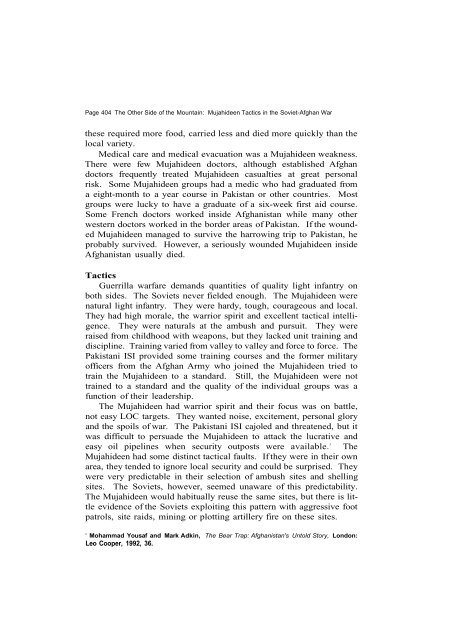- Page 2:
THE OTHER SIDE OF THE MOUNTAIN: Muj
- Page 5 and 6:
Chapter 3: Shelling Attacks 105 Vig
- Page 7 and 8:
Chapter 14: Urban Combat 365 Vignet
- Page 9 and 10:
FOREWORD When the Soviet Union inva
- Page 11 and 12:
ACKNOWLEDGMENTS This book would not
- Page 13 and 14:
PREFACE Afghanistan, a multi-ethnic
- Page 15 and 16:
system, an oppressive central gover
- Page 17 and 18:
each other than trying to establish
- Page 19 and 20:
through various Afghan political fa
- Page 21 and 22:
Academy and Army Staff College. His
- Page 23 and 24:
THE OTHER SIDE OF THE MOUNTAIN: Muj
- Page 25 and 26:
Page 4 The Other Side of the Mounta
- Page 27 and 28:
Page 6 The Other Side of the Mounta
- Page 29 and 30:
Page 8 The Other Side of the Mounta
- Page 31 and 32:
Page 10 The Other Side of the Mount
- Page 33 and 34:
Page 12 The Other Side of the Mount
- Page 35 and 36:
Page 14 The Other Side of the Mount
- Page 37 and 38:
Page 16 The Other Side of the Mount
- Page 39 and 40:
Page 18 The Other Side of the Mount
- Page 41 and 42:
Page 20 The Other Side of the Mount
- Page 43 and 44:
Page 22 The Other Side of the Mount
- Page 45 and 46:
Page 24 The Other Side of the Mount
- Page 47 and 48:
Page 26 The Other Side of the Mount
- Page 49 and 50:
Page 28 The Other Side of the Mount
- Page 51 and 52:
Page 30 The Other Side of the Mount
- Page 53 and 54:
Page 32 The Other Side of the Mount
- Page 56:
VIGNETTE 9 DEH-KHWAJA AMBUSH by Com
- Page 59 and 60:
Page 38 The Other Side of the Mount
- Page 61 and 62:
Page 40 The Other Side of the Mount
- Page 64 and 65:
VIGNETTE 11 KANDAHAR AMBUSHES by Co
- Page 66 and 67:
Chapter 1, Vignette 11 Page 45 In t
- Page 68 and 69:
Chapter 1, Vignette 11 Page 47 and
- Page 70 and 71:
VIGNETTE 12 AMBUSH AT QALA-E HAIDAR
- Page 72 and 73:
Chapter 1, Vignette 12 Page 51 On t
- Page 74 and 75:
VIGNETTE 13 AMBUSH AT THE SADRE AZA
- Page 76:
VIGNETTE 14 AMBUSH AT MAZAR CREEK b
- Page 80:
VIGNETTE 15 AMBUSH AT QAFUS TANGAY
- Page 83 and 84:
Page 62 The Other Side of the Mount
- Page 85 and 86:
Page 64 The Other Side of the Mount
- Page 87 and 88:
Chapter 1, Vignette 16 Page 66 thei
- Page 89 and 90:
CHAPTER 2 RAIDS The raid is a surpr
- Page 91 and 92:
VIGNETTE 1 RAID ON THE TOTUMDARA SE
- Page 93 and 94:
VIGNETTE 2 CHAMTALA RAID by Tsaranw
- Page 95 and 96:
Chapter 2, Vignette 2 Page 75 the e
- Page 97 and 98:
VIGNETTE 4 ATTACK ON THE TSAWKEY SE
- Page 99:
Chapter 2, Vignette 4 Page 79 COMME
- Page 102 and 103:
Page 82 The Other Side of the Mount
- Page 104 and 105:
Page 84 The Other Side of the Mount
- Page 106 and 107:
Page 86 The Other Side of the Mount
- Page 108 and 109:
Page 88 The Other Side of the Mount
- Page 111 and 112:
Chapter 2, Vignette 7 Page 91 Mujah
- Page 113:
VIGNETTE 8 RAID ON LATABAND SECURIT
- Page 116 and 117:
Page 96 The Other Side of the Mount
- Page 119 and 120:
Chapter 2, Vignette 9 Page 99 eight
- Page 121 and 122:
VIGNETTE 10 RAID ON THE BRIDGE POST
- Page 123 and 124:
Chapter 2, Vignette 10 Page 103 cha
- Page 126 and 127:
VIGNETTE 1 A SHELLING ATTACK TURNS
- Page 128 and 129:
Chapter 3, Vignette 1 Page 109 troo
- Page 130:
Chapter 3, Vignette 1 Page 111 COMM
- Page 133 and 134:
Page 114 The Other Side of the Moun
- Page 135 and 136:
CHAPTER 4 ATTACKING A STRONG POINT
- Page 137 and 138:
VIGNETTE 1 TAKING ALINGAR DISTRICT
- Page 139:
Chapter 4, Vignette 1 Page 121 capt
- Page 142 and 143:
Page 124 The Other Side of the Moun
- Page 144 and 145:
Page 126 The Other Side of the Moun
- Page 146 and 147:
Page 128 The Other Side of the Moun
- Page 148 and 149:
Page 130 The Other Side of the Moun
- Page 150 and 151:
VIGNETTE 5 STORMING GULA'I by Haji
- Page 152 and 153:
Page 134 The Other Side of the Moun
- Page 154 and 155:
Page 136 The Other Side of the Moun
- Page 156 and 157:
CHAPTER 5 MINE WARFARE Mine warfare
- Page 158 and 159:
VIGNETTE 1 MUJAHIDEEN DEMOLITION ME
- Page 160 and 161:
VIGNETTE 2 MINING ATTACKS NEAR MEHT
- Page 162 and 163:
Chapter 5, Vignette 2 Page 145 set
- Page 164 and 165:
Page 148 The Other Side of the Moun
- Page 166 and 167:
Page 150 The Other Side of the Moun
- Page 168 and 169:
Page 152 The Other Side of the Moun
- Page 171:
Chapter 6, Vignette 2 Page 155 ing,
- Page 174 and 175:
Page 158 The Other Side of the Moun
- Page 177 and 178:
VIGNETTE 4 DEFENSE OF A RIVER LINE
- Page 179 and 180:
Chapter 6, Vignette 4 Page 163 rive
- Page 181:
VIGNETTE 5 THE DEFENSE AGAINST THE
- Page 184 and 185:
Page 168 The Other Side of the Moun
- Page 186 and 187:
Page 170 The Other Side of the Moun
- Page 188 and 189:
Page 172 The Other Side of the Moun
- Page 191 and 192:
VIGNETTE 6 OPERATION GHASHEY (ARROW
- Page 193 and 194:
Chapter 6, Vignette 6 Page 177 B. N
- Page 195 and 196:
Chapter 6, Vignette 6 Page 179 Ther
- Page 197 and 198:
Chapter 6, Vignette 6 Page 181 2. B
- Page 199 and 200:
Chapter 6, Vignette 6 Page 183 over
- Page 201 and 202:
Chapter 6, Vignette 6 Page 185 COMM
- Page 203:
Chapter 6, Vignette 6 Page 187 moun
- Page 206 and 207:
Page 190 The Other Side of the Moun
- Page 208 and 209:
COMMENTARY: The confident commander
- Page 210 and 211:
Page 194 The Other Side of the Moun
- Page 212 and 213:
CHAPTER 7 SIEGE WARFARE The Mujahid
- Page 214 and 215:
VIGNETTE 1 FAILED SIEGE AT URGUN by
- Page 216 and 217:
Chapter 7, Vignette 1 Page 201 At 2
- Page 218 and 219:
Chapter 7, Vignette 1 Page 203 the
- Page 220 and 221:
VIGNETTE 2 DEHRAWUD OFFENSIVE In th
- Page 222 and 223:
Chapter 7, Vignette 2 Page 207 road
- Page 224 and 225:
Chapter 7, Vignette 2 Page 209 appr
- Page 226 and 227:
Page 212 The Other Side of the Moun
- Page 228 and 229:
Page 214 The Other Side of the Moun
- Page 230 and 231:
Page 216 The Other Side of the Moun
- Page 232 and 233:
Page 218 The Other Side of the Moun
- Page 234 and 235:
Page 220 The Other Side of the Moun
- Page 236 and 237:
Page 222 The Other Side of the Moun
- Page 238 and 239:
Page 224 The Other Side of the Moun
- Page 240 and 241:
CHAPTER 9 FIGHTING HELIBORNE INSERT
- Page 242 and 243:
VIGNETTE 1 SOVIET HELIBORNE RAID AC
- Page 244 and 245:
Chapter 9, Vignette 1 Page 231 retr
- Page 246 and 247:
VIGNETTE 2 SOVIET RAID ON KANDA by
- Page 248 and 249:
Page 236 The Other Side of the Moun
- Page 250 and 251:
Page 238 The Other Side of the Moun
- Page 252 and 253:
CHAPTER 10 DEFENDING AGAINST A CORD
- Page 254 and 255:
VIGNETTE 1 BATTLE OF BARAKI BARAK b
- Page 256 and 257:
Chapter 10, Vignette 1 Page 245 ene
- Page 258 and 259:
VIGNETJE 2 DEFENDING AGAINST AN OFF
- Page 260 and 261:
Chapter 10, Vignette 2 Page 249 the
- Page 262:
VIGNETTE 3 BATTLE FOR KAMA by Abdul
- Page 265 and 266:
Page 254 The Other Side of the Moun
- Page 267 and 268:
Page 256 The Other Side of the Moun
- Page 269 and 270:
Page 258 The Other Side of the Moun
- Page 271 and 272:
Page 260 The Other Side of the Moun
- Page 273 and 274:
Page 262 The Other Side of the Moun
- Page 276 and 277:
Chapter 10, Vignette 5 Page 265 Naz
- Page 278 and 279:
CHAPTER 11 DEFENDING BASE CAMPS Alt
- Page 280 and 281:
VIGNETTE 1 SOVIET OFFENSIVE THROUGH
- Page 282 and 283:
Chapter 11, Vignette 1 Page 271 At
- Page 284 and 285:
VIGNETTE 2 DEFENDING SURKHAB BASE C
- Page 286 and 287:
Chapter 11, Vignette 2 Page 275 hig
- Page 288 and 289:
VIGNETTE 3 FALL OF SURKHAB BASE CAM
- Page 290 and 291:
Chapter 11, Vignette 3 Page 279 get
- Page 292:
VIGNETTE 4 Loss OF THE TOR GHAR BAS
- Page 295 and 296:
Page 284 The Other Side of the Moun
- Page 297 and 298:
Page 286 The Other Side of the Moun
- Page 299 and 300:
Page 288 The Other Side of the Moun
- Page 301 and 302:
Page 290 The Other Side of the Moun
- Page 303 and 304:
Page 292 The Other Side of the Moun
- Page 305 and 306:
Page 294 the Other Side of the Moun
- Page 308 and 309:
VIGNETTE 6 QALA-E NAW BASE CAMP DEF
- Page 310 and 311:
Chapter 11, Vignette 6 Page 299 the
- Page 312 and 313:
VIGNETTE 7 DEFENDING THE SUBURBS OF
- Page 314 and 315:
Chapter 11, Vignette 7 Page 303 the
- Page 316:
VIGNETTE 8 DEFENDING THE MALAJAT by
- Page 319 and 320:
Page 308 The Other Side of the Moun
- Page 322 and 323:
VIGNETTE 9 BATTLE FOR CHAHARQULBA V
- Page 324 and 325:
Chapter 11, Vignette 9 Page 313 tan
- Page 326 and 327:
Chapter 11, Vignette 9 Page 315 wou
- Page 328 and 329:
VIGNETTE 10 ZHAWAR ONE by Lieutenan
- Page 330 and 331:
Chapter 11, Vignette 10 Page 319 D3
- Page 332 and 333:
Chapter 11, Vignette 10 Page 321 "b
- Page 334 and 335:
VIGNETTE 11 ZHAWAR TWO by Lieutenan
- Page 336 and 337:
Chapter 11, Vignette 11 Page 325 DR
- Page 338:
VIGNETTE 12 KRER ONE by Commander A
- Page 341 and 342:
Page 330 The Other Side of the Moun
- Page 344 and 345:
Chapter 11, Vignette 13 Page 333 ou
- Page 346 and 347:
VIGNETTE 14 THE FALL OF CHAGHNI BAS
- Page 348 and 349:
Chapter 11, Vignette 14 Page 337 en
- Page 350 and 351:
Chapter 11, Vignette 14 Page 339 Th
- Page 352 and 353:
CHAPTER 12 COUNTERAMBUSH Counteramb
- Page 354 and 355:
VIGNETTE 1 CAUGHT IN A SOVIET AMBUS
- Page 356 and 357:
Chapter 12, Vignette 1 Page 345 and
- Page 358 and 359:
VIGNETTE 2 AMBUSHED AT FARZA by Com
- Page 360 and 361:
VIGNETTE 3 BLASTING OUT OF AN AMBUS
- Page 362:
VIGNETTE 5 AMBUSHED ON THE HIGH PLA
- Page 365 and 366: Page 354 The Other Side of the Moun
- Page 367 and 368: VIGNETTE 1 A TRIP TO THE "GOVERNOR'
- Page 369 and 370: Page 358 The Other Side of the Moun
- Page 371 and 372: Page 360 The Other Side of the Moun
- Page 374 and 375: VIGNETTE 3 ESCAPE FROM THE ARGHANDA
- Page 376 and 377: CHAPTER 14: URBAN COMBAT Urban guer
- Page 378 and 379: Chapter 14, Vignette 1 Page 367 the
- Page 380 and 381: Chapter 14, Vignette 2 Page 369 sec
- Page 382: VIGNETTE 3 INCIDENT AT QALA-E JABAR
- Page 385 and 386: Page 374 The Other Side of the Moun
- Page 387 and 388: Page 376 The Other Side of the Moun
- Page 389 and 390: Page 378 The Other Side of the Moun
- Page 391 and 392: Page 380 The Other Side of the Moun
- Page 393 and 394: VIGNETTE 7 ALCOHOL CAN BE DEADLY by
- Page 395 and 396: Page 384 The Other Side of the Moun
- Page 397 and 398: Page 386 The Other Side of the Moun
- Page 399 and 400: Page 388 The Other Side of the Moun
- Page 401 and 402: Page 390 The Other Side of the Moun
- Page 403 and 404: Page 392 The Other Side of the Moun
- Page 405 and 406: Page 394 The Other Side of the Moun
- Page 407 and 408: Vignette 14 Raid on 15 Division Gar
- Page 409 and 410: CHAPTER 15 CONCLUSION "As a nation,
- Page 411 and 412: Chapter 15 Page 401 Disunity of Com
- Page 413: Chapter 15 Page 403 ing the large a
- Page 417 and 418: GLOSSARY Afghanistan National Liber
- Page 419 and 420: Glossary Page 409 Korean War. It sa
- Page 421 and 422: Glossary Page 411 Kochi—Kochi are
- Page 423 and 424: Glossary Page 413 Shia—The minori
- Page 425 and 426: Rifleman Light Machine Gun Medium M
- Page 427 and 428: INDEX Abdul-Rahman, Mawlawi 167, 16
- Page 429 and 430: Razek, Abdul 335 Index Page 419 Sad
- Page 431: The Other Side of the Mountain: Muj




